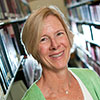This article is more than 5 years old.
LITA goes until noon on Sunday, and since the only return direct flight to Greensboro after the close of the conference isn’t until 7:25 pm this evening (sigh), I’ll spend the time before the shuttle comes to take me to the airport to wrap up.
This morning began at a breakfast of this year’s and next year’s LITA National Forum Planning Committee. There were lively discussions about what worked this time around and what could be done better or differently next year in Salt Lake City. Everyone agreed that this has been a successful Forum, but there are always new ideas generated and feedback received from attendees that can be considered to make the next conference even better.
Poster sessions were presented this morning during the breakfast hour. Most of the topics were about projects that are familiar topics at ZSR, so it was interesting to see how other institutions had approached things like viral marketing, open source applications (see Erik’s post), Google Analytics and using del.icio.us as bookmarks to create virtual reference.
There was one final round of concurrent sessions, so I attended “Illogical Students: don’t Blame ‘Em, Game ‘Em,” where librarian Marsh Spiegelman and mathematics professor Richard Glass from Nassau Community College shared their combined effort to incorporate information literacy into math/computer science courses. They were doing some interesting things with blogs, wikis and Second Life. Some of their ideas are shared in their wiki.
R. David Lankes, from the Information Institute of Syracuse and professor at the School of Information Studies, gave the final keynote presentation. His topic was “Obligation of Leadership.” He talked about the mentors in his life and what they taught him that applies to our profession:
- We can’t wait for leaders.
- We can’t wait for change.
- We must serve society through stewardship.
He was an inspiring speaker and was passionate as he urged the audience that “We can do better.”
Lankes believes:
- Knowledge is created through conversation.
- Libraries are in the Knowledge Business.
- Therefore, libraries are in the conversation business.
He sees librarianship as a noble profession, one where our power is not in the size of our collections, or forged by the items we catalog, but in our impact on the communities and societies we serve. And this power happens through our facilitation of the conversations taking place by our patrons and our communities.
It was a good send off after 3 days of interesting programs!
